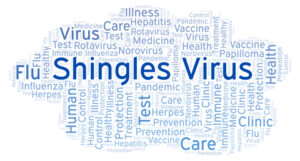 My husband and I have traded shoes. He’s almost always the one who feels helpless when MS causes my pain or discomfort. Now I feel helpless watching him grimace from the pain caused by his shingles. The difference is I couldn’t prevent MS; he could have prevented shingles.
My husband and I have traded shoes. He’s almost always the one who feels helpless when MS causes my pain or discomfort. Now I feel helpless watching him grimace from the pain caused by his shingles. The difference is I couldn’t prevent MS; he could have prevented shingles.
It started as a few tiny bumps on his back last week that looked like five or six small mesquito bites. It was itchy and my husband assumed he was bitten when working near the pond outside one humid morning. Over the next few days, more little bumps appeared and despite my insistence that he see the doctor asap, my stubborn anti-doc hubby put anti-itch cream on it and said it wasn’t necessary. BIG mistake.

One week later, he woke up and his back looked like the photo on the right. Alarmed, he called the doctor, and the appointment was made for one hour later. Yep, it was shingles. Yep, it was too late to start an anti-viral to lessen the achy, burning symptoms he was experiencing. No, there was little he could do except apply cool compresses for relief. The shingles had to run its course that would last at least several weeks and could continue for months. The rash is still spreading. And he is miserable.

I’m familiar with shingles, and having MS, that’s the last thing I want to get. Even without MS, it’s something nobody would want. There is a highly-effective vaccine available now called Shingrix that can prevent it. I wrote about this in my book, Managing MS, in the sections about Vaccines and Making Decisions when Managing MS:
“People with MS may be at higher risk of getting shingles, the flu, etc. because of reduced immune system function from disease-modifying treatments. High-dose steroids, often used during relapses, may also increase the risk.
When I was deciding what to about the Shingrix vaccine, I initially researched the vaccine from diverse, credible online sources. Then I asked both my neurologist and PCP about it. Finally, I asked other MSers and “normal” people I knew who received the vaccine about their experiences
People with MS can’t receive vaccines that contain a live virus. It puts them at even greater risk of developing the very disease they are trying to protect themselves from. Since the Shingrix vaccine to prevent shingles does not contain a live virus, it is considered quite safe for people with depressed immune systems.
Shingrix is recommended for folks over 50+ years. The occurrence of shingles is highest when you are older, sick, extremely stressed out, have a weak/depressed immune system. (e.g., from a physical injury, steroids, chemo, DMTs…) About one out of every three people in the United States (if they had chicken pox) will develop shingles in their lifetime. (Source: CDC) Being a senior, I know a lot of people who had shingles; it is nasty! My opinion? I’d take the shot over getting the virus.”
For more information, click on this recent article entitled, “Should I Get the Shingles Vaccine If I Have MS?”
If my instincts cause me to feel unsure when making a decision like this, I follow my mantra, “When in doubt, don’t!” It’s helpful to take a pause and think through it again another time, evaluating the pros and cons. My pros overrode the cons with this vaccine, and I had no doubt that I should get it despite the possible temporary side effects.
It’s something to seriously think about today and discuss with your doctor. If taking DMTs or steroids, consult with your neurologist about possibly adjusting the timing MS treatments so that vaccine effectiveness isn’t lowered.
Debbie Petrina
Author of Managing MS
Moderator, MultipleSclerosis.net
